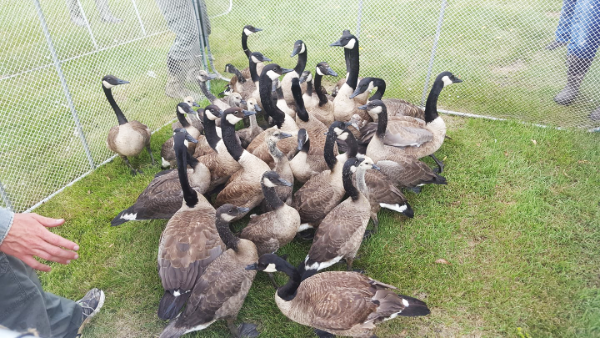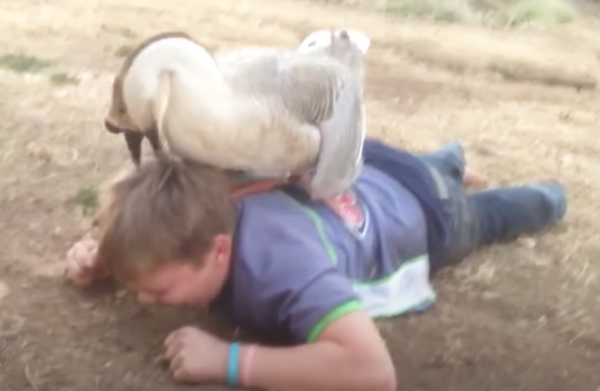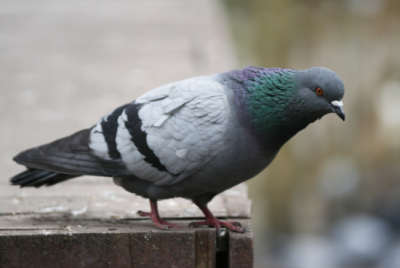Geese Damage: What problems do these water birds cause?
At first sight, geese may seem like gentle and adorable creatures, especially the goslings. But when a large flock settles close to your home, you’ll undoubtedly become aware of the unpleasant habits of these seemingly gentle birds.
These large boisterous birds are naturally drawn to bodies of water, but over the years, they have adapted to living virtually anywhere with lush vegetation and small ponds. As the population of geese continues to grow, so is the concern for the environmental and economic effects of having these birds wander around in our neighborhoods.
Despite their gentle demeanor, geese can wreak real havoc on your gardens. They can be a big nuisance and cost you lots of money, and it doesn’t stop there. Here are the 5 major damages geese cause.
Crop Damage
Geese are herbivores and feed on green vegetation. Although aquatic plants and grasses are their major food source, geese feed on almost entirely all grain crops. As herbivorous animals, these birds will flock into a garden or farmland to graze, they’ll trample on sprouting seedlings, and pluck off flourishing and lush grain crops. They do great and irreparable damage to both emerging and growing grain plants, and unfortunately, grazed plants do not recover.
Landscape Damage

Geese move in large flocks and when one such flock moves through your property, expect any flowers and grasses on their path to get eaten and trampled on. This will result in serious damage to lawns, flowers, and expensive ornamental plants. Continuous grazing and trampling will kill plants, cause soil compaction and leave a once green and lush lawn as bare as a desert. With just one or two birds, it’s very unlikely that this will happen. But geese rarely move in twos, if you see one coming, expect a flock to follow. Besides lawns and gardens, geese will also graze on parks and golf courses causing landscape damage.
Water Pollution
As water birds, these creatures mostly dwell close to lakes, ponds and other bodies of water. Geese enjoy immersions in water and while at it, they very willingly drop feces into the water. These droppings contain high amounts of nitrogen, phosphorous and harmful microorganisms, and an accumulation of such waste in a water body compromises water quality. Nitrogen and phosphorous promote the growth of aquatic plants and algae. This further pollutes the water and causes a significant decrease in the water oxygen level at night, thus destroying delicate aquatic lives and possibly killing fish.
Attacks on Humans

During their breeding season, geese, especially the ganders, become very aggressive in a bid to protect brooding mother geese and the young ones. This is a natural trait, and they will attack anyone they perceive as a threat to the next generation of geese. A goose attack may leave a few minor injuries like bruises on adults, but it can be more traumatic for kids who unknowingly wander close to a goose nest.
Build up of Bird Droppings
As one would expect, these birds have no discretion on how and where to drop their poop. Unlike the droppings of other birds, geese droppings look like those of small dogs. The bird droppings do nothing but cause more damage to your lawn and gardens as they contaminate the soil and kill flowers and crops. Geese excreta also contains pathogenic microorganisms like E. coli and salmonella, and pose a threat to anyone who mistakenly comes in contact with it.
Wrapping Up
A large population of geese in an area also results in more road accidents. This may seem unlikely, but a large flock of geese crossing a motorway can cause accidents and vehicle damage. Due to the increasing number of geese population and consequently geese damage, some countries now regard them as pests and approve the hurting and killing of these birds. Depending on where you live, you can get a license to cull wild geese in your neighborhood. If you live in an area with a large number of these creatures and you want to protect your property from the damages they can cause, your best bet may be a bird or goose repellent.

